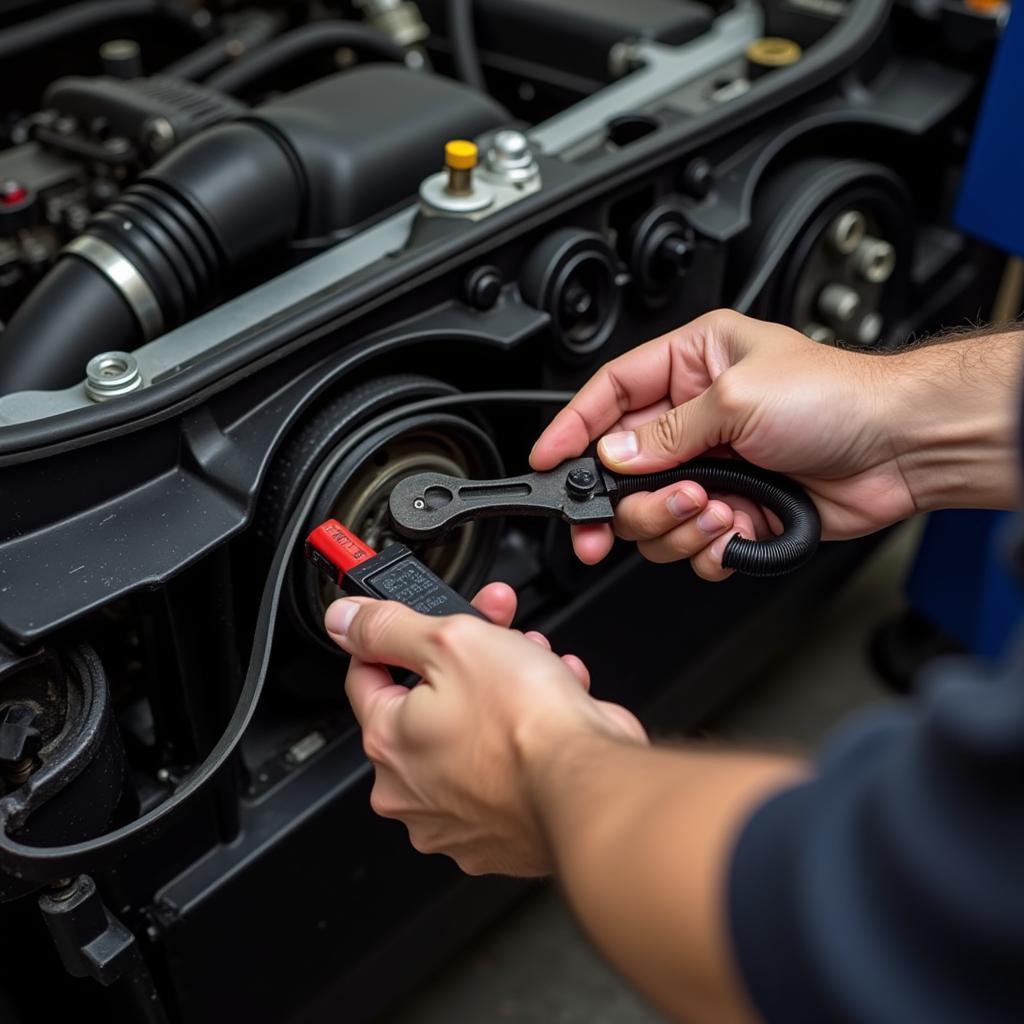Experiencing a sweltering car interior on a hot day due to a malfunctioning AC compressor is a common problem for car owners. The AC compressor is the heart of your car’s air conditioning system, responsible for compressing and circulating refrigerant to cool the air. If your AC compressor isn’t working correctly, it can lead to warm air blowing from your vents, making for an uncomfortable ride. This comprehensive guide will walk you through the potential causes of AC compressor failure and provide step-by-step instructions on how to fix it.
Understanding the AC Compressor and Its Common Problems
Before we delve into the fixes, it’s crucial to understand the basics of your car’s AC compressor and what can go wrong. The AC compressor is driven by the engine’s serpentine belt and works by pressurizing and circulating refrigerant through the AC system. This process removes heat from the air, resulting in the cool air blowing from your car’s vents.
Several issues can lead to AC compressor failure, including:
-
Refrigerant Leak: A lack of refrigerant due to leaks in the system is a common culprit behind AC compressor failure. Refrigerant carries oil that lubricates the compressor, so a leak can lead to insufficient lubrication and eventual compressor failure.
-
Electrical Issues: The AC compressor relies on electrical signals to function correctly. Faulty wiring, a blown fuse, or a malfunctioning AC compressor clutch can disrupt these signals, leading to compressor issues.
-
Worn Out Components: Like any other car part, AC compressors have a lifespan. Wear and tear on internal components like bearings, seals, and pistons can eventually lead to reduced efficiency or complete failure.
-
Contaminated System: Moisture or debris entering the AC system can contaminate the refrigerant and damage the compressor. This contamination can occur due to improper servicing or damage to AC components.
Troubleshooting Your Car AC Compressor
Before assuming the worst, it’s essential to troubleshoot the AC system to pinpoint the root cause of the problem.
Here’s a step-by-step guide:
-
Check the AC Fuse and Relay: Locate your car’s fuse box (refer to your owner’s manual) and identify the fuse and relay associated with the AC system. Inspect them for any signs of damage or burning. Replace them if necessary.
-
Inspect the Serpentine Belt: A loose or damaged serpentine belt can affect the AC compressor’s ability to function correctly. Check for any cracks, fraying, or looseness. If the belt is damaged, replace it.
-
Listen for Unusual Noises: Start your engine and turn the AC on high. Listen carefully for any unusual noises coming from the AC compressor, such as clicking, grinding, or squealing. These sounds can indicate a failing compressor bearing or clutch.
-
Check for Refrigerant Leaks: Look for signs of refrigerant leaks around the AC compressor and its connecting hoses. Refrigerant leaks often leave an oily residue. If you suspect a leak, it’s best to consult a professional mechanic.
 Mechanic Checking AC Belt
Mechanic Checking AC Belt
How to Fix Compressor AC Car Issues
Fixing a car AC compressor can range from simple DIY tasks to more complex repairs requiring professional assistance. Here’s a breakdown:
DIY Fixes:
-
Recharging the AC System: If you’ve determined that a low refrigerant charge is the issue and you’re comfortable working with automotive systems, you can recharge the AC system yourself using a DIY recharge kit. However, it’s essential to follow the instructions carefully and wear safety glasses and gloves.
-
Replacing the AC Relay or Fuse: If you find a blown fuse or a faulty relay, replacing them is a straightforward process. Simply locate the correct replacements (refer to your owner’s manual) and swap them out.
Professional Repairs:
-
Repairing Refrigerant Leaks: Locating and repairing refrigerant leaks requires specialized tools and expertise. A professional mechanic can use an electronic leak detector to pinpoint the source of the leak and repair or replace the affected components.
-
Replacing the AC Compressor: If the compressor is damaged beyond repair, replacement is the only solution. This procedure involves evacuating and recharging the AC system, which necessitates professional equipment and knowledge.
-
Addressing Electrical Problems: Diagnosing and fixing electrical issues related to the AC compressor requires advanced electrical troubleshooting skills. It’s crucial to consult a qualified mechanic to avoid potential damage to the car’s electrical system.
 Mechanic Repairing Car AC System
Mechanic Repairing Car AC System
Preventing Future AC Compressor Problems
Preventing AC compressor issues is always better than dealing with costly repairs. Here are some preventive measures:
-
Regular AC System Inspections: Include an AC system check during your routine car maintenance. A mechanic can inspect for leaks, check refrigerant levels, and ensure the system is functioning correctly.
-
Running the AC Regularly: Even during cooler months, run your car’s AC for a few minutes every couple of weeks. This helps keep the refrigerant circulating and prevents seals from drying out.
-
Addressing Issues Promptly: Don’t ignore any signs of AC trouble, such as warm air blowing or unusual noises. Address these issues promptly to prevent further damage and potentially save on costly repairs down the line.
Conclusion
A malfunctioning AC compressor can significantly impact your driving comfort, especially during hot weather. By understanding the common causes and implementing preventive measures, you can prolong the life of your AC system and enjoy a cool and comfortable ride. While some fixes can be tackled with DIY approaches, it’s crucial to recognize when professional assistance is necessary to ensure safe and effective repairs.
For any concerns or questions regarding your car’s AC system, don’t hesitate to reach out to the experts at AutoTipPro. You can reach us at +1 (641) 206-8880 or visit our office at 500 N St Mary’s St, San Antonio, TX 78205, United States.
FAQs
1. How long does a car AC compressor last?
A car AC compressor typically lasts between 8-10 years or around 150,000 miles, depending on usage and maintenance.
2. How much does it cost to replace a car AC compressor?
Replacing a car AC compressor can cost anywhere between $500 to $1,200, depending on the car make and model, labor costs, and the type of compressor used.
3. Can I drive my car with a bad AC compressor?
While it’s technically possible to drive with a bad AC compressor, it’s not recommended. A malfunctioning compressor can put extra strain on your engine and lead to further damage to the AC system.
4. How can I tell if my AC compressor is leaking?
Signs of an AC compressor leak include: an oily residue around the compressor and connecting hoses, a hissing sound when the AC is running, and warm air blowing from the vents.
5. Can a low refrigerant charge damage my AC compressor?
Yes, a low refrigerant charge can lead to insufficient lubrication of the AC compressor, causing it to overheat and potentially seize up.





Leave a Reply